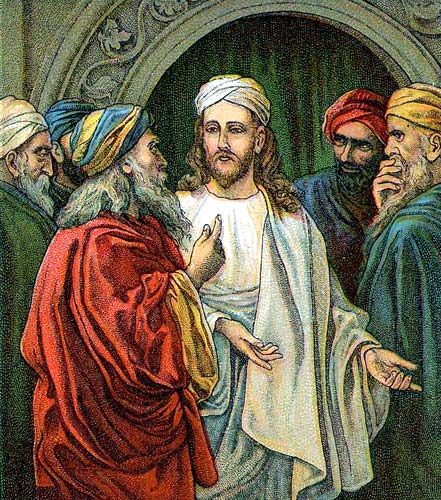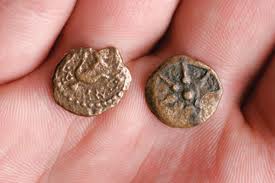
THE QUESTIONINGS
OF THE SADDUCEES AND OF THE LAWYER.
ON the same day that Jesus put the Pharisees to silence there came to him a company of Sadducees, who say there is to be no resurrection.
They thought they could show that the doctrine of the resurrection of the dead was untrue, and began by saying, "Master, Moses said, If a man die, having no children, his brother shall marry his wife, and raise up seed unto his brother.
Now there were with us seven brethren; and the first, when he had married a wife, deceased,
and having no issue, left his wife unto his brother; likewise the second also, and the third, unto the seventh.
And last of all, the woman died also.
Therefore, in the resurrection, whose wife shall she be of the seven? For they all had her."
But Jesus said, "Ye do err, not knowing the scriptures, nor the power of God."
"But they that shall be accounted worthy to obtain that world, and the resurrection from the dead, neither marry nor are given in marriage, neither can they die any more; for they are equal unto the angels, and are the children of God, being the children of the resurrection."
"And as touching the dead, that they rise, have ye not read in the book of Moses, at the bush, how God spake unto him, saying, I am the God of Abraham, and the God of Isaac, and the God of Jacob?
He is not the God of the dead, but of the living.
Ye therefore do greatly err."
When the multitude heard these words, they were astonished at the wisdom of Jesus, and certain of the scribes also acknowledged the excellence of his words, saying, "Master, thou hast well said."
When the Pharisees heard that Jesus had put the Sadducees to silence, they held a council, and chose one of their number, a lawyer of great merit and sound judgment, and put him forward as their spokesman.
All their former craftiness had failed, and they now trusted their cause to a really honest man; yet one who had not hitherto believed on Jesus.
Approaching Jesus, the lawyer said, "Master, which is the great commandment in the law?"
Jesus at once replied, "Thou shalt love the Lord thy God with all thy heart, and with all thy soul, and with all thy mind.
This is the first and great commandment. And the second is like unto it, Thou shalt love thy neighbor as thyself.
On these two commandments hang all the law and the prophets."
Then the lawyer spoke, saying, "Well, Master, thou hast said the truth; for there is one God, and there is none other but he; and to love him with all the heart, and with all the understanding, and with all the soul, and with all the strength and to love his neighbor as himself, is more than all whole burnt offerings and sacrifices."
When Jesus saw that the man answered discreetly, he said unto him, "Thou art not far from the kingdom of God."
After this no one dared to ask him any more questions.

JESUS QUESTIONS THE PHARISEES.
THE Pharisees had made two unsuccessful attempts to entangle Jesus in his talk, but now while they were gathered together he asked them a question, saying, "What say ye of Christ? Whose son is he?" And they say unto him, "The son of David." Jesus then questioned them still farther. Referring to the 110th Psalm, he said, "How then doth David in spirit call him Lord, saying, The Lord said unto my Lord, Sit thou at my right hand till I make thine enemies thy footstool? If David then called him Lord, how is he his son?" These questions were too hard for the Pharisees, and they were greatly perplexed in not being able to answer them. The Scripture record says,
"And no man was able to answer him a word, neither durst any man from that time forth ask him any more questions." The common people, however, heard him gladly; and our Lord, turning to them, said, "Beware of the scribes and the Pharisees; for although they teach the law that the Lord gave Moses, they do not obey that law in their lives; and while you should be careful to obey the words of the law which they read to you, you must not do according to their works; `for they say and do not:'" He taught them in substance as follows: "These proud teachers care more for the good opinion of men than they do for the approval of God. They love to walk in long robes, to be honorably saluted in public places, to have the highest seats in the synagogue, and the chief rooms at feasts; but they are unkind and exacting toward the widows and the fatherless, and as a pretense to cover this wickedness, they make long prayers in places where they will be seen and heard of men." Jesus plainly taught that these men would be held more guilty, in the sight of God than they would have been, if they had not made such great pretensions to piety.
Outside of the temple building there were enclosed places called courts. These were separated from one another by low walls of stone. One of these was called the court of the women. In this court was the treasury of the temple, where the people dropped in money to be used in buying incense and such other things as were needed in the services of the temple.
As Jesus sat over against the treasury, he watched the people as they dropped their offerings into the large trumpet-shaped openings that led into the treasury. Many rich people cast in much. After a time there came along a poor widow, who cast in the smallest coin that was known among the Jews. This coin was valued at two mites, or about one third of a cent.
When Jesus noticed this, he called his disciples to him, and said, "Verily I say unto you, That this poor widow hath cast more in than they all which have cast into the treasury; for all they did cast in of their abundance; but she of her want did cast in all that she had, even all her living.